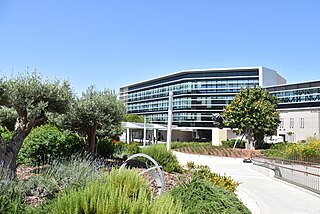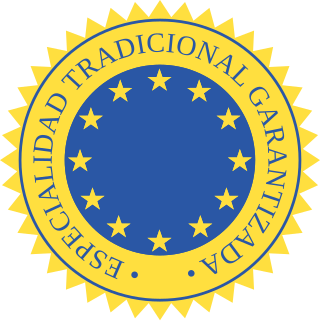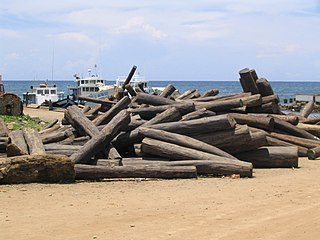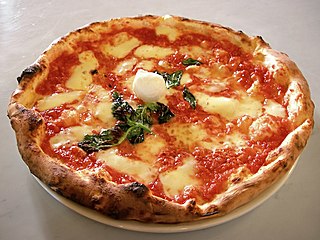
The Common Agricultural Policy (CAP) is the agricultural policy of the European Commission. It implements a system of agricultural subsidies and other programmes. It was introduced in 1962 and has since then undergone several changes to reduce the EEC budget cost and consider rural development in its aims. It has however, been criticised on the grounds of its cost, its environmental, and humanitarian effects.

The European Union Intellectual Property Office (EUIPO) is a decentralised agency of the EU responsible for the registration of EU-wide unitary trade marks and industrial design rights. These exist alongside the intellectual property rights of individual EU member states, so the agency also works to harmonise EU-wide and national registration processes. Other responsibilities include the administration of the rights of certain products in the EU to carry geographical indications.
Dumping, in economics, is a form of predatory pricing, especially in the context of international trade. It occurs when manufacturers export a product to another country at a price below the normal price with an injuring effect. The objective of dumping is to increase market share in a foreign market by driving out competition and thereby create a monopoly situation where the exporter will be able to unilaterally dictate price and quality of the product. Trade treaties might include mechanisms to alleviate problems related to dumping, such as countervailing duty penalties and anti-dumping statutes.

A traditional speciality guaranteed is a traditional food product protected under European Union and/or United Kingdom law. This label differs from the geographical indications protected designation of origin (PDO) and protected geographical indication (PGI) in that the TSG label does not certify that the protected food product has a link to a specific geographical area, and thus a product can be produced outside the area or country from which it originates.

Three European Union schemes of geographical indications and traditional specialties, known as protected designation of origin (PDO), protected geographical indication (PGI), and traditional speciality guaranteed (TSG), promote and protect names of agricultural products and foodstuffs, wines and spirits. Products registered under one of the three schemes may be marked with the logo for that scheme to help identify those products. The schemes are based on the legal framework provided by the EU Regulation No 1151/2012 of the European Parliament and of the Council of 21 November 2012 on quality schemes for agricultural products and foodstuffs. This regulation applies within the EU as well as in Northern Ireland. Protection of the registered products is gradually expanded internationally via bilateral agreements between the EU and non-EU countries. It ensures that only products genuinely originating in that region are allowed to be identified as such in commerce. The legislation first came into force in 1992. The purpose of the law is to protect the reputation of the regional foods, promote rural and agricultural activity, help producers obtain a premium price for their authentic products, and eliminate the unfair competition and misleading of consumers by non-genuine products, which may be of inferior quality or of different flavour. Critics argue that many of the names, sought for protection by the EU, have become commonplace in trade and should not be protected.

The following four classifications of wine constitute the Italian system of labelling and legally protecting Italian wine:

Organic certification is a certification process for producers of organic food and other organic agricultural products. In general, any business directly involved in food production can be certified, including seed suppliers, farmers, food processors, retailers and restaurants. A lesser known counterpart is certification for organic textiles that includes certification of textile products made from organically grown fibres.

Illegal logging is the harvest, transportation, purchase, or sale of timber in violation of laws. The harvesting procedure itself may be illegal, including using corrupt means to gain access to forests; extraction without permission, or from a protected area; the cutting down of protected species; or the extraction of timber in excess of agreed limits. Illegal logging is a driving force for a number of environmental issues such as deforestation, soil erosion and biodiversity loss which can drive larger-scale environmental crises such as climate change and other forms of environmental degradation.
Basel II classified legal risk as a subset of operational risk in 2003. This conception is based on a business perspective, recognizing that there are threats entailed in the business operating environment. The idea is that businesses do not operate in a vacuum and in the exploitation of opportunities and their engagement with other businesses, their activities tend to become subjects of legal liabilities and obligations.

The EU-organic production-regulation is a part of the European Union regulation that sets rules about the production of organic agricultural and livestock products and how to label them. In the EU, organic farming and organic food are more commonly known as ecological or biological.
The Agreement on the Application of Sanitary and Phytosanitary Measures, also known as the SPS Agreement or just SPS, is an international treaty of the World Trade Organization (WTO). It was negotiated during the Uruguay Round of the General Agreement on Tariffs and Trade (GATT), and entered into force with the establishment of the WTO at the beginning of 1995. Broadly, the sanitary and phytosanitary ("SPS") measures covered by the agreement are those aimed at the protection of human, animal or plant life or health from certain risks.
Consumer protection is the practice of safeguarding buyers of goods and services, and the public, against unfair practices in the marketplace. Consumer protection measures are often established by law. Such laws are intended to prevent businesses from engaging in fraud or specified unfair practices to gain an advantage over competitors or to mislead consumers. They may also provide additional protection for the general public which may be impacted by a product even when they are not the direct purchaser or consumer of that product. For example, government regulations may require businesses to disclose detailed information about their products—particularly in areas where public health or safety is an issue, such as with food or automobiles.

Neapolitan pizza is a style of pizza made with tomatoes and mozzarella cheese. The tomatoes must be either San Marzano tomatoes or pomodorini del Piennolo del Vesuvio, which grow on the volcanic plains to the south of Mount Vesuvius. The cheese must be mozzarella di bufala campana, a protected designation of origin cheese made with the milk from water buffalo raised in the marshlands of Campania and Lazio in a semi-wild state, or fior di latte, a cow's milk mozzarella created according to the procedure for which it was registered as a traditional speciality guaranteed (TSG). Pizza napoletana is a TSG product in the European Union and the United Kingdom, and the art of its making is included on UNESCO's list of intangible cultural heritage.
Genetic engineering in the European Union has varying degrees of regulation.
Market surveillance for products ensures that products on the market conform to applicable laws and regulations. This helps to foster trust among consumers buying products or financial services and protects consumers and professionals from harm from non-compliant products. It also helps companies that comply to stay in business and avoid losing market share to rogue traders.

The Direct Payments Regulation(EU) No 1307/2013 is a Regulation in EU law that sets out rules for receiving subsidies under the Common Agricultural Policy.








